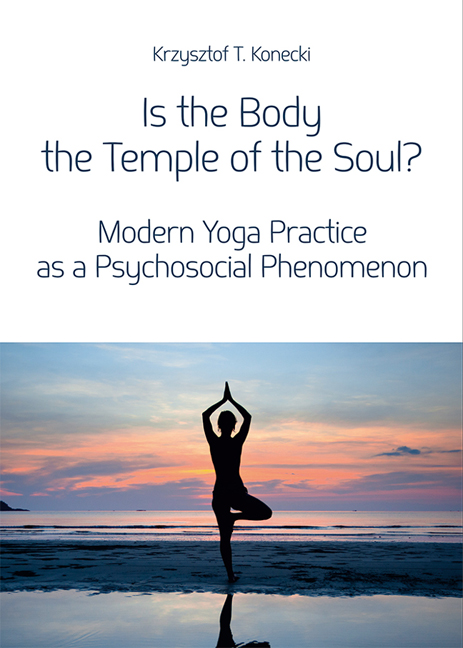Book contents
- Frontmatter
- Contents
- Foreword (Michał Szczepanik)
- Introduction
- Chapter 1 Philosophy and hatha-yoga practice. Para-religious aspects of hatha-yoga
- Chapter 2 The social world of yoga practice
- Chapter 3 Commonsense definitions of yoga and its meaning for practitioners
- Chapter 4 The process of becoming a hatha-yoga practitioner
- Chapter 5 Visual transmission of knowledge and the meaning of corporality and gestures in the social world of yoga practice
- Chapter 6 Emotions and yoga practicing. Working on emotions and achieving “emotional culture” without emotions
- Chapter 7 Teacher and guru in hatha-yoga practice
- Conclusions
- Bibliography
Chapter 7 - Teacher and guru in hatha-yoga practice
Published online by Cambridge University Press: 10 January 2018
- Frontmatter
- Contents
- Foreword (Michał Szczepanik)
- Introduction
- Chapter 1 Philosophy and hatha-yoga practice. Para-religious aspects of hatha-yoga
- Chapter 2 The social world of yoga practice
- Chapter 3 Commonsense definitions of yoga and its meaning for practitioners
- Chapter 4 The process of becoming a hatha-yoga practitioner
- Chapter 5 Visual transmission of knowledge and the meaning of corporality and gestures in the social world of yoga practice
- Chapter 6 Emotions and yoga practicing. Working on emotions and achieving “emotional culture” without emotions
- Chapter 7 Teacher and guru in hatha-yoga practice
- Conclusions
- Bibliography
Summary
Introduction
A teacher who has a great authority confirmed in a line of inheriting the practice from grand masters, being a morally significant other, is called a guru. The teacher allows overcoming the obstacles that appear on the path of the pupil. It is an extremely important task for a guru:
The syllable gu means darkness, ru light. Guru disperses the darkness and brings enlightenment. The notion of guru is full of deep sense. He is not a usual guide. He is a spiritual teacher that teaches the way of life and not only how to earn for this life. He passes the knowledge about the spirit, and the one who gets this knowledge is shishya (pupil). The relationship between guru and shishya is special; it is something more than a relationship between the child and the parents, husband and wife, or among friends. Guru is free from egotism. With devotion, without looking for fame or benefits, he guides the pupil towards the ultimate goal. He shows the paths of God and watches the improvements in learning and in the discipline leading him through this path. With love, he awakens trust in him, devotion, discipline, deep understanding, and enlightenment. Believing in his student, the guru does his best for the knowledge to be absorbed. He encourages him to ask questions, learning the truth by analyzing and questioning. The student should have needed qualifications such as high type of awareness and advanced spiritual development; he has to have trust, love, and devotion for his “guru” (Iyengar 2005a: 9–11).
You salute your guru on every occasion, what is seen in all Iyengar's books where he thanks his teachers for all the teaching they did.
The relationship between Arjuna and Krishna described in Bhagavadgita could be here an example of such tradition of parampara (see: 1993).
The role of the teacher is extremely important in the development of an individual. The student has to, according to Iyengar, trust his teacher completely (2008). It is to some extent an idealized concept of a student-master relationship, it is possible if we deal with a real guru and a highly motivated student on the other side.
- Type
- Chapter
- Information
- Is the Body the Temple of the Soul?Modern Yoga Practice as a Psychosocial Phenomenon, pp. 195 - 208Publisher: Jagiellonian University PressPrint publication year: 2016



